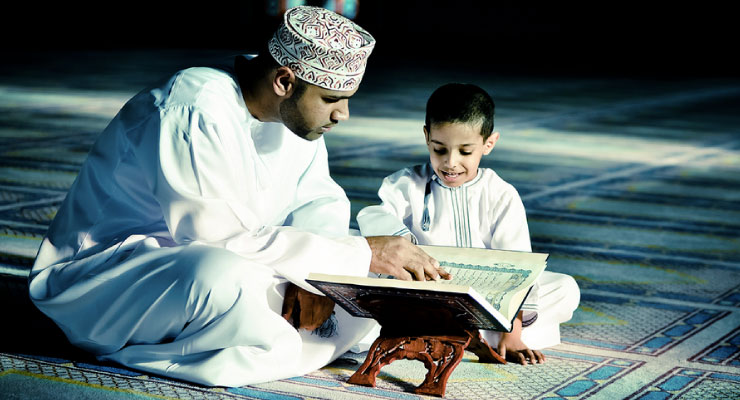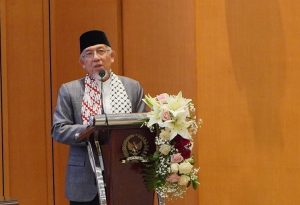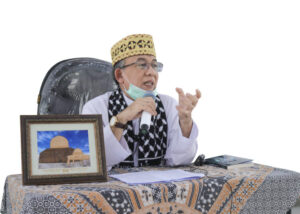﷽
By Imaamul Muslimin Shaykh Yakhsyallah Mansur
Educating children is a parent’s obligation. Good and bad children really depend on how the child receives education from their parents.
Islam teaches to educate children with love, like Allah’s loving nature towards Subhanahu Wa Ta’ala His servants. One of the verses that contains the nature of Allah which can be a basis for educating children is the sentence basmallah.
Also Read: Prophet Sulaiman Alaihi Salam, the Greatest Muslim King of All Time
Word of Allah Subhanahu Wa Ta’ala:
بِسْمِ ٱللَّهِ ٱلرَّحْمَـٰنِ ٱلرَّحِيمِ (الفاتحة [١]: ١)
Meaning: “In the name of Allah, the Most Gracious, the Most Merciful.” (Q.S. Al-Fatihah [1]: 1)
What is meant by “Basmalah” is the saying of Bismillahir Rahmanir Rahim.
Also Read: Imaam Yakhsyallah Mansur: Surah At-Tin Indicates the Command to Liberate Al-Aqsa
Ibn Kathir explained that the scholars started reading the Kitabullah with the basmalah and the scholars agreed that the basmalah was part of a verse from surah An-Naml [27], 30:
إِنَّهُۥ مِن سُلَيْمَـٰنَ وَإِنَّهُۥ بِسْمِ ٱللَّهِ ٱلرَّحْمَـٰن ِ ٱلرَّحِيمِ (النمل [٢٧]: ٣٠)
Meaning: “Indeed (the letter) is from Solomon and indeed (its contents): “In the name of Allah, the Most Gracious, the Most Merciful.”
Then the scholars disagreed about this basmalah in several ways:
Also Read: Imaam Yakhsyallah: Nurture Love for the Prophet, One Will Be with Whom One Loves
Is basmalah a separate verse at the beginning of each surah?. Is basmalah only written at the beginning of each surah?. Is basmalah a part of one verse at the beginning of each surah?. Is basmalah the beginning of surah Al-Fatihah and not another surah. Is it? Basmalah was written to separate one surah from another while it itself is not a verse.
Each of the opinions above has followers both among Salaf scholars (who lived from the first century of the Hijrah to the fifth century) and Khalaf scholars (who lived after the fifth century of the Hijrah until now) with their respective arguments.
Next, Ibn Kathir quoted the hadiths about the virtues of basmalah, both authentic, hasan and dhaif. Among those narrated by Al-Hafiz Ibnu Mardawaih from Abu Said said, “The Messenger of Allah Sallallahu Alaihi Wasallam said, ‘Indeed, Isa bin Maryam Alaihis Salam was handed over by his mother to Kuttab to be taught to write.
Then his teacher said, ‘Write.’ Isa said, ‘What should I write?’ His teacher answered, ‘Bismillah’. Isa asked him, ‘What is the meaning of bismillah?’ His teacher answered, ‘I do not know.’ considered god, Ar-Rahman means the Most Merciful in this world and the hereafter and Ar-Rahim means the Most Merciful in the hereafter.”
Also Read: Friday Sermon: Emulating the Firmness of the Prophet in Struggle
This hadith was also narrated by Ibn Jarir, then he said, “This hadith is very gharib (strange). “Perhaps it is authentic to other than the Messenger of Allah, Shallallahu Alaihi Wasallam, and perhaps this hadith is an Israiliyat hadith, not from a Marfu’ hadith.”
The letter “ba” in basmalah
Basmalah is the first verse of surah Al-Fatihah which consists of 19 letters and begins with the letter “ba”. Sayid Bakari Al-Makki bin Sayid Muhammad Syatha Ad-Dimyati in his book Kifayatul Atqiya’ wa Minhajul Ashfiya, explains why basmalah starts with the letter “ba” and not other letters. He said:
وَقَالُوْا اَوْدَعَ اللهُ جَمِيْعَ الْعُلُوْمِ ف above ُ الْعَوَالِمِ بِيْ
Also Read: Imaam Yakhsyallah: Muslims Unity as Key to Victory of Islam
“Shufi scholars say, ‘Allah entrusts all his knowledge to the letter ba, namely because of My power (bî) everything that already exists came into being, because of My power also came into being something that will exist, and the existence of the universe is due to My power. ”
This statement is the meaning of the words of the scholars, “I do not see anything unless there is Allah. So that the scholars understand that whatever they see there is under Allah’s supervision.”
Sayid Bakari Al-Makki added that ba’ is the letter of the lips (syafawi). Reciting it causes the mouth to open. The beginning of a human’s mouth is opened when he gives testimony that Allah is his God as He says:
وَإِذْ أَخَذَ رَبُّكَ مِنۢ بَنِىٓ ءَادَمَ مِن ظُهُورِهِمْ ذُرِّيَّتَهُمْ وَأَشْهَدَهُمْ عَلَىٰٓ أَنفُسِهِمْ أَلَسْتُ بِرَبِّكُمْ ۖ قَالُوا۟ بَلَىٰ ۛ شَهِدْنَآ ۛ أَن تَقُولُوا۟ يَوْمَ ٱلْقِيَـٰمَةِ إِنَّا كُنَّا عَنْ هَـٰذَا غَـٰفِلِينَ (الأعراف [٧]: ١٧٢)
Also Read: Friday Sermon: Prophet Muhammad Is Not a Political Figure
Meaning: “And (remember) when your Lord brought out from the root of Adam their descendants and Allah took testimony against their spirits (saying), “Am I not your Lord?” They answered, “بَلَىٰ (Yes, You are our Lord), we bear witness.” (We do this) so that on the Day of Resurrection you will not say, “Indeed, at that time we were heedless of this (the oneness of God),” (Q.S. Al-A’raf [7]: 172)
The next explanation is that the letter ba’ in the basmalah pronunciation is always read as kasrah. In Arabic it is called jar which only occurs in isim (noun). According to M. Khalilur Rahman, isim in the literal sense is a high degree, while a high degree can be obtained by being humble (الجر).
In line with this explanation, Sayyid Bakari Al-Makki differentiates the nature of the letters ba’ and alif with two opposite properties. He said, “Indeed, the letter alif contains the meaning of feeling the highest in rank, feeling that you have the most ownership and serves to lengthen the reading, for this reason the letter alif was discarded.”
The lafadz بسم consists of the words بِ and اسم which means “by mentioning the name”. In the Basmalah language in the Ottoman Rasm it is not written with با سم الله but the alif is discarded as بسم الله because the alif has the opposite meaning to the letter ba’. The letter alif means high-hearted while the letter ba’ means humble.
Also Read: Without Knowledge, Congregation Is Merely a Crowd Without Direction
The letter “ba'” in the basmalah can be applied in educational activities, including the following:
First, the letter “ba'” is a letter which contains God’s knowledge, so in educating we should only convey God’s knowledge. This knowledge of Allah is very broad and globally found in the Koran. Therefore, the main basis for education is the Al-Quran which is also the morals of Rasulullah Sallallahu Alaihi Wasallam.
Second, the letter ba’ is a letter that the servant pronounces before Allah as a form of testimony that Allah is the only creator, namely in the word بَلَىٰ. Therefore, in educating children, the first thing we do is introduce them to God.
Third, philosophically, the letter “ba'” has a better meaning than the other letters, especially the “alif” which is directly adjacent to the “ba'” in the basmalah sentence.
Also Read: Friday Sermon: Grateful for Indonesia’s Independence by Supporting Palestine’s Freedom
Therefore, in education, good values should be developed to the maximum so that the potential for bad things in students can be minimized.
Benefits of the Letter Ba’ in Education
Imam Abu Syamah al-Maqdisi rahimahullah (died 665 AH) explained that the ulama interpreted the letter ba’ – in basmalah– with two interpretations. Some say that the letter ba’ here means isti’anah, while others interpret that the letter ba’ here means mushahabah.
An example of the sound of a sentence with the letter ba’ which means isti’anah is ‘katabtu bil qalami’ meaning ‘I write with the help of a pen’. An example of a sentence with the letter “ba'” which means “mushahabah” is “bi’tukal faras bi sarajihi” which means “I am selling you this horse together with its saddle”.
Also Read: The Bestial Nature of Netanyahu
Imam Asy-Syaukani rahimahullah (died 1250 AH) in his commentary explained that the letter ba’ in the sentence basmalah means isti’anah/request for help and help or means mushahabah/togetherness. He also mentioned that the second interpretation – that ba’ means mushahabah – was chosen and strengthened by Az-Zamakhsyari.
This second opinion was also chosen by Shaykh Abdullah bin Ibrahim al-Qar’awi hafizhahullah. This opinion also seems to be supported by Shaykh Abdurrahman bin Hasan rahimahullah (died 1285 AH).
The opinion chosen by Dr. Sulaiman bin Ibrahim Al-Lahim said that the letter “ba'” here means “isti’anah”. Likewise, the interpretation of Shaykh Salih Al-Fauzan hafizhahullah is that the meaning of saying basmalah is ‘asking for help and assistance/bersti’anah by mentioning the name of Allah’. So this sentence is said in order to ask Allah for help and seek blessings by mentioning His name.
In line with this, the interpretation of Shaykh Muhammad bin Salih al-‘Utsaimin rahimahullah is that the meaning of saying basmalah is ‘I read while asking for help and assistance and seeking blessings by mentioning the name of Allah’.
Also Read: Why A Mother’s Literacy Matters: Lessons from Rose Kennedy
Therefore, one of the important benefits of the letter “ba'” in the basmalah sentence is to seek blessings by reciting the name of Allah. The meaning of this sentence is ‘I start by saying the name of Allah before the words I want to say or before the actions I want to do’. So, it contains the meaning of seeking blessings from Allah and asking Him for help. This is also the meaning of the explanation conveyed by Imam Ibn Kathir rahimahullah in his tafsir.
These two ba’ principles are very good when applied in educational activities. An educator should always ask for help (isti’anah) from Allah and feel that Allah accompanies him (mushahabah). Thus, in carrying out educational activities a person will always be maximal and careful, especially if in education what we seek is blessings from Allah Subhanahu Wa Ta’ala and always remember (dhikr) Allah Subhanahu Wa Ta’ala.
The meaning of blessing in the Quran and As-Sunnah is the lasting goodness or increasing goodness so that all good educational activities always increase and last. (T/RE1/P2)
وَاللهُ أَعْلَمُ بِالصَّوَابِ
Mi’raj News Agency (MINA)

































 Mina Indonesia
Mina Indonesia Mina Arabic
Mina Arabic